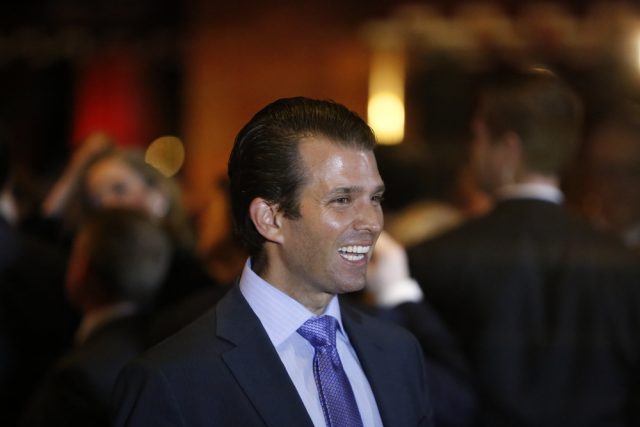 Many lawyers and law professors have suggested that new emails prove, or at least strongly suggest, that Donald Trump Jr. may have committed a variety of crimes – including primarily a violation of campaign finance laws, but also possible conspiracy to defraud the United States, or even treason – but all seemingly overlook the broad protection Trump Jr. enjoys under the First Amendment.
Many lawyers and law professors have suggested that new emails prove, or at least strongly suggest, that Donald Trump Jr. may have committed a variety of crimes – including primarily a violation of campaign finance laws, but also possible conspiracy to defraud the United States, or even treason – but all seemingly overlook the broad protection Trump Jr. enjoys under the First Amendment.
Campaign finance law, specifically 52 U.S.C. 30121, prohibits American campaign officials from soliciting from foreign governments “anything of value . . . in connection with” an election. As several commentators have pointed out, “anything of value” need not be limited to money or the equivalent. At least in other contexts involving other federal statutes, the term has been stretched to including sexual services, a promise to provide photographic services, etc.
A federal regulation, 11 CFR 110.20 (which is persuasive but not controlling), suggests that something more is required: at least “substantial assistance” to the foreign spender in providing this “thing of value.” The Federal Election Commission [FEC] has argued that the definition can encompass goods or services, like air travel or food, provided free or at below-market rates.
But all this is a far cry from arguing that providing or soliciting nothing more than truthful information, especially if it is of interest to the public, can be made a crime without violating the First Amendment which generally protects speech, especially speech which deals with public matters.
Moreover, criminal statutes, to avoid being held unconstitutional as void for vagueness, must spell out clearly exactly what acts are punishable. This rule is applied even more strictly where one interpretation – e.g., that truthful information about a candidate is a “thing of value” under campaign finance laws – would create serious constitutional problems. In other words, the courts have often said that if Congress wishes to criminalize speech, it must say so very clearly, and not indirectly and/or only by implication.
Thus, while there are a few narrow exceptions – e.g., the Constitution apparently permits criminalizing the release (but not necessarily the receipt and publication) of classified information, information protected by trade secrecy laws, illegally obtained insider trading information, etc. – it hard to see that free speech would not be fatally infringed by a law purporting to punish any campaign official from receiving, from any source, information especially if it’s truthful ,which directly relates to the fitness of a major presidential candidate.
For example, if a foreign government has information that presidential candidate committed a serious crime while in that country, the First Amendment would seem to guarantee anyone the freedom to receive that important information and to make it public, by going to a newspaper, putting it on the Internet, or using it in the campaign of candidate A’s opponent. This information, which in some sense might seem to be a thing of value, is also very important information the public is entitled to know about before voting.
Indeed, in the landmark Pentagon Papers case, the U.S. Supreme Court held that newspapers were free to publish documents which were classified at the time, even over President Nixon’s objection of executive authority to prohibit their publication as very damaging to the public interest.
Similarly, providing and/or receiving truthful information which makes voters less likely to vote for candidate B almost certainly does not qualify as “undermining the election process” since the whole purpose of an election is to permit voters to choose the best candidate based upon all known information, not with certain information being kept from them simply because it originally came from a foreign government.
So, even if at some point there was evidence that Trump Jr. and others acting in concert with him not only solicited but also actually obtained information from Russia which was seem by some as damaging to the Democratic candidate, the First Amendment would likely provide a strong if not impregnable defense.
Despite this, I nevertheless concedes that it would not be inappropriate for authorities to fully investigate all the circumstances, and that the incident might have very important political consequences.
John F. Banzhaf III is a Professor of Public Interest Law at George Washington University Law School.
[Image via Screengab]
This is an opinion piece. The views expressed in this article are those of just the author.